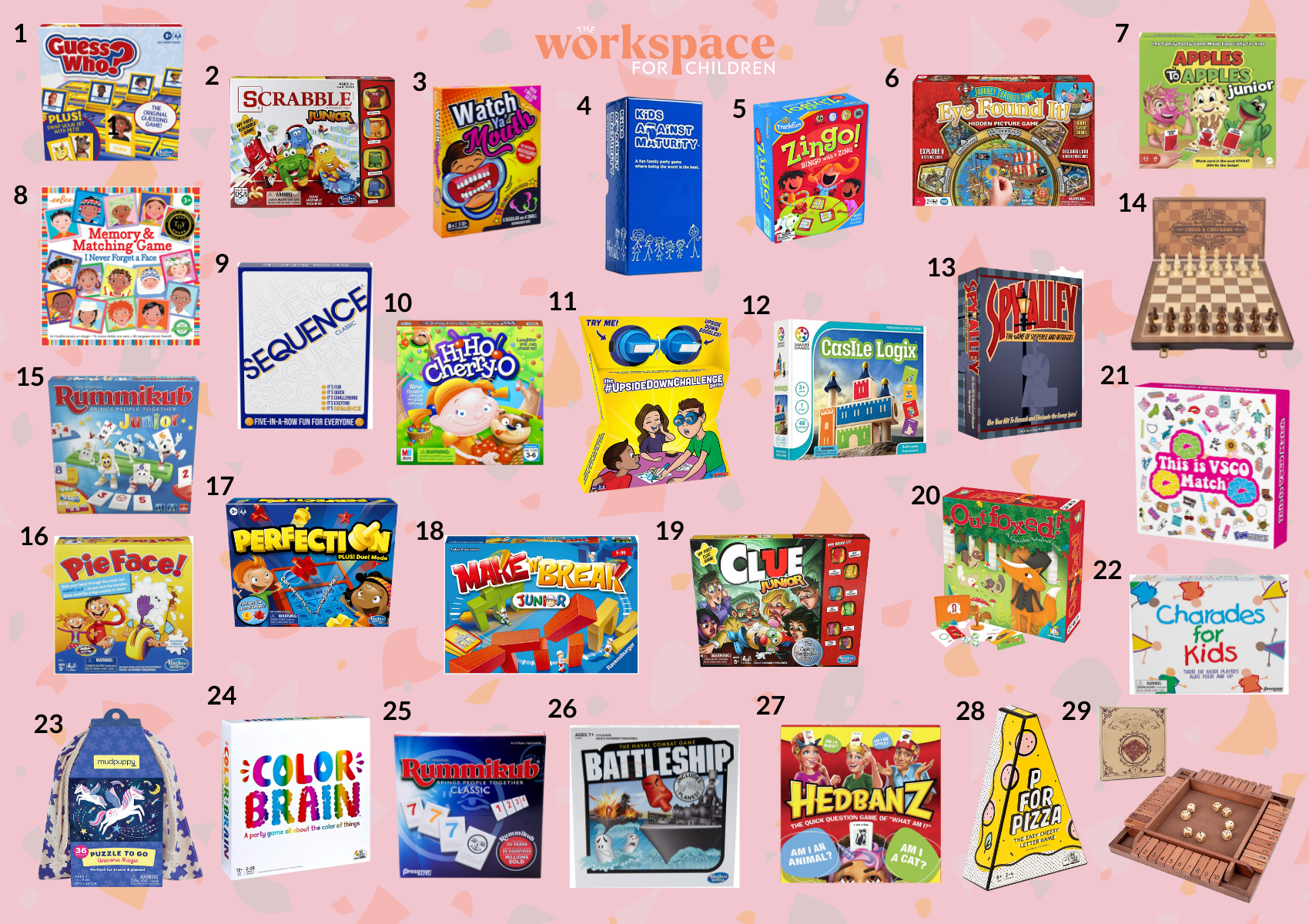Board Games For Family
I recently stumbled upon a fantastic product called “Board Games For Family” and I couldn’t wait to share it with you. These board games are specifically designed to bring families together and create countless moments of joy and laughter. Whether you’re looking for a fun way to bond with your loved ones, or you want to add some excitement to your family game nights, “Board Games For Family” has got you covered. With a wide range of options to choose from, there’s something for everyone, regardless of age or skill level. Get ready to embark on an incredible journey of shared experiences and unforgettable memories with these incredible board games.
Benefits of Playing Board Games

This image is property of i1.wp.com.
Promotes Family Bonding
Playing board games is a wonderful way to promote family bonding. It creates an opportunity for the whole family to come together, spend quality time, and have fun. Whether it’s a weekend afternoon or a chilly winter evening, gathering around a table to play board games brings the family closer and encourages laughter, conversation, and friendly competition. It allows family members to connect with one another, share experiences, and create lasting memories.
Improves Cognitive Skills
Engaging in board games offers numerous benefits for cognitive development. Many board games require critical thinking, problem-solving, and logical reasoning, which help to enhance cognitive skills. Games such as chess and Scrabble, for example, challenge players to strategize, plan ahead, and come up with creative solutions. These mental exercises sharpen memory, improve concentration, and boost overall cognitive function. By playing board games regularly, cognitive skills can be strengthened and further developed.
Encourages Communication
Board games are an excellent tool to encourage communication among family members. They create a relaxed and interactive atmosphere where everyone can share their thoughts and opinions openly. Through gameplay, players learn to articulate their ideas, express themselves clearly, and engage in lively discussions. Board games with cooperative elements, such as Pandemic or Forbidden Island, require collaboration and effective communication to achieve shared goals. This fosters teamwork and cooperation, strengthening family bonds and communication skills simultaneously.
Teaches Strategy and Planning
Board games provide a platform for learning strategic thinking and planning. Many games involve making calculated moves, anticipating opponents’ actions, and adapting strategies accordingly. This cultivates the ability to think ahead, evaluate risks and rewards, and formulate long-term plans. Strategy-based games like Settlers of Catan or Risk require players to make informed decisions and weigh different options, leading to the development of analytical and strategic thinking skills. These skills are not only beneficial during gameplay but also in real-life situations that demand strategic decision-making.
Develops Decision-Making Skills
Playing board games helps in the development of effective decision-making skills. In most games, players are faced with choices that directly impact the outcome of the game. By analyzing various possibilities, weighing consequences, and selecting an optimal course of action, individuals practice making decisions under pressure. The ability to make sound decisions efficiently is a valuable life skill that can be honed through board game sessions. Moreover, decision-making in board games often involves managing limited resources, time constraints, and risk assessment, further enhancing critical thinking and decision-making abilities.
Choosing the Right Board Games
Consider Age and Skill Levels
When selecting board games for a family, it’s crucial to consider the age and skill levels of the players. Games designed specifically for young children might not be challenging enough for older family members, while complex games can be overwhelming for younger players. It’s essential to choose games that are suitable and enjoyable for everyone involved. Many board games have age recommendations or indicators of difficulty levels, making it easier to select games that match the family’s overall skill set.
Determine Player Count
Another important aspect to consider when choosing board games is the player count. Some games are designed for a specific number of players, while others can accommodate a wide range. It’s important to ensure that the selected game can be played by the entire family or can be modified to accommodate a reasonable number of players. This will ensure that everyone can actively participate and fully enjoy the game.
Decide on Game Complexity
Board games come in various levels of complexity, from simple and casual to highly strategic and intricate. Choosing a game that matches the family’s collective skill level and experience is key to maximizing enjoyment. It’s important to strike a balance between games that are easy to grasp for beginners and those that offer depth and challenge to keep more experienced players engaged. Reading reviews, researching game mechanics, and considering the preferences and skills of family members can help in selecting games with suitable complexity levels.
Evaluate Game Duration
Consideration of game duration is essential, especially when planning a family game night. Some board games can be completed within 30 minutes, while others may stretch on for hours. Taking into account the time available and the attention span of family members will help in choosing games that fit the allotted gaming session. Shorter games can be ideal for weekdays or when time is limited, while longer games can be enjoyed during weekends or special occasions when the family has more leisure time.
Consider Theme and Interests
Choosing board games with themes and interests that resonate with the family can significantly enhance the gaming experience. Whether it’s fantasy, history, adventure, or science fiction, there is a wide range of themes to choose from. Consider the hobbies, preferences, and shared interests of family members to find games that will capture their imagination and keep them engaged. A well-selected theme can create a more immersive and enjoyable gaming experience for everyone involved.
Classic Board Games
Monopoly
Monopoly has been a classic favorite board game for generations and continues to be widely enjoyed by families. It is a game of strategy, negotiation, and luck, where players strive to become the wealthiest by buying, selling, and trading properties. Monopoly offers a valuable learning experience in financial management, decision-making, and negotiation skills.
Scrabble
Scrabble is a classic word game that challenges players to create words from letter tiles and strategically place them on a crossword-style board. This game not only promotes vocabulary building but also exercises critical thinking, spatial reasoning, and strategic planning. Scrabble is an excellent choice for families who enjoy wordplay and friendly competition.
Clue
Clue, also known as Cluedo, is a classic murder mystery board game where players must solve a crime by deducing the culprit, weapon, and location. This deductive reasoning game stimulates critical thinking, logical deduction, and analytical skills. Solving the mystery requires players to gather clues, make informed deductions, and eliminate possibilities, making Clue an exciting and engaging choice for family game nights.
Chess
Chess is a timeless strategy game that tests the players’ intellect, foresight, and planning abilities. This two-player game involves strategic moves, anticipating opponents’ strategies, and thinking several steps ahead. Chess not only cultivates logical thinking and problem-solving skills but also promotes patience, concentration, and perseverance. Playing chess as a family can create a challenging and intellectually stimulating experience.

This image is property of www.verywellfamily.com.
Backgammon
Backgammon is one of the oldest known board games, dating back thousands of years. It is a race game where players aim to move their pieces off the board through strategic moves and dice rolls. Backgammon offers a combination of strategy, probability assessment, and risk management. Playing this classic game helps develop decision-making skills, adaptability, and the ability to strategize in dynamic situations.
Modern Board Games
Ticket to Ride
Ticket to Ride is a modern classic that combines strategy, planning, and a touch of luck. Players compete to build train routes across a map, aiming to connect specific destinations on their ticket cards. Ticket to Ride is easily accessible for players of all ages, featuring straightforward rules and colorful components. With its engaging gameplay and variety of expansions, it has become a beloved game for families worldwide.
Settlers of Catan
Settlers of Catan, now known simply as Catan, is a highly regarded strategy game that has sparked a resurgence of interest in board gaming. In this game, players take on the role of settlers aiming to build and develop settlements, roads, and cities on the island of Catan. Negotiation, resource management, and careful planning are key to success in Catan. With its modular board and numerous expansions, Catan offers endless replayability and appeals to families seeking a deeper strategic experience.
Pandemic
Pandemic is a cooperative board game that immerses players in a race against time to save the world from deadly diseases. Each player takes on a different role, and together they must work as a team to discover cures and prevent outbreaks. Pandemic fosters teamwork, communication, and strategic decision-making, as players must prioritize actions and make difficult choices to combat the spreading diseases. This cooperative game is a thrilling and rewarding experience for families looking to test their problem-solving skills and save humanity together.
Codenames
Codenames is a captivating word association game that challenges players to communicate and interpret clues to locate secret agents in the field. Two teams compete against each other, with one player acting as the spymaster, giving clue words that relate to the agents’ codenames. Codenames encourages creative thinking, effective communication, and the ability to make clever connections. It is an ideal choice for families who enjoy word games and cooperative play.
Carcassonne
Carcassonne is a tile-laying game where players build the landscape of the medieval French city, Carcassonne, piece by piece. By strategically placing tiles and followers, players compete to gain the most points through completing roads, cities, farms, and monasteries. Carcassonne offers a blend of strategy, spatial awareness, and opportunistic decision-making. Its simple rules and engaging gameplay make it accessible for players of all ages, ensuring enjoyment for the whole family.
Educational Board Games
Mathematics-based Games
There are numerous board games available that help children develop and strengthen their mathematical skills. Games like “Math Dice” or “Sum Swamp” encourage basic arithmetic, number recognition, and problem-solving. These games make learning math fun and interactive, enabling children to practice mathematical concepts in an engaging way.

This image is property of hips.hearstapps.com.
Language and Vocabulary Games
Board games like “Scattergories” or “Balderdash” promote language skills and vocabulary expansion. These games challenge players to think quickly, articulate their ideas coherently, and come up with creative answers. They enhance wordplay, improve vocabulary, and develop effective communication skills.
Science and Nature Games
Science and nature-themed board games provide an entertaining and educational way to learn about the natural world. Games like “Photosynthesis” or “Evolution” introduce concepts such as ecosystem dynamics, evolution, and environmental awareness. These games foster curiosity, critical thinking, and scientific reasoning, making learning about science an enjoyable experience.
History and Geography Games
Board games centered around history and geography offer a fantastic opportunity for children to expand their knowledge of different cultures, landmarks, and historical events. Games like “Timeline” or “Ticket to Ride: Europe” take players on an educational journey through time and geography, stimulating curiosity and improving geographical and historical awareness.
Critical Thinking Games
Critical thinking games, such as “Rush Hour” or “Strategic Tic-Tac-Toe,” challenge players to think strategically, analyze situations, and make logical decisions. These games enhance problem-solving abilities, pattern recognition, and the ability to think critically under pressure. They sharpen analytical skills and develop a mindset geared towards problem-solving in various contexts.
Cooperative Board Games
Forbidden Island
Forbidden Island is a cooperative adventure game where players work together to collect treasures from a sinking island and escape before it completely submerges. Cooperation, collaboration, and effective communication are vital for success in this game. Forbidden Island encourages players to strategize, share information, and support one another, fostering a sense of teamwork and unity.
Pandemic
As mentioned earlier, Pandemic is a cooperative board game that requires players to work together to prevent worldwide outbreaks of deadly diseases. Each player assumes a unique role with special abilities, and they must coordinate their actions, share information, and make joint decisions to save humanity. Pandemic’s cooperative nature promotes teamwork, trust-building, and decision-making in a high-stress setting.
Hanabi
Hanabi is a cooperative card game where players attempt to create the most impressive fireworks display. The twist is that players hold their cards facing away from them, relying on the instructions given by teammates to play the correct cards. Hanabi challenges players’ memory, communication skills, and deduction abilities while fostering collaboration and shared objectives.

This image is property of i5.walmartimages.com.
Mysterium
Mysterium is a hauntingly immersive cooperative game where one player assumes the role of a ghost, providing cryptic clues to help other players solve a murder mystery. Cooperation, interpretation, and clever deduction are essential in unraveling the mystery before time runs out. Mysterium encourages players to communicate effectively, share observations, and work together to solve the enigmatic puzzle.
Robinson Crusoe: Adventures on the Cursed Island
In Robinson Crusoe: Adventures on the Cursed Island, players find themselves stranded on a deserted island, where they must cooperate to survive against the elements and various challenges. With limited resources and against the odds, players must make collective decisions, prioritize tasks, and rely on each other’s skills to overcome the obstacles they face. This highly thematic game provides an intense cooperative experience that demands strategic planning, teamwork, and resource management.
Party and Group Board Games
Telestrations
Telestrations is a hilarious party game that combines drawing and guessing. It starts with a secret word that a player must draw, then passes their book to the next player, who must guess what the drawing represents. This process continues until everyone’s book returns to them, resulting in hilarious misinterpretations and laughter. Telestrations is perfect for parties or gatherings as it encourages social interaction, laughter, and creativity.
Dixit
Dixit is a captivating and imaginative game that sparks creative storytelling and interpretation. Players take turns being the storyteller, describing a card from their hand with a word, phrase, or sentence. Other players must select a card from their hand that best matches the description. The cards are then shuffled and everyone votes on which card they believe belongs to the storyteller. Dixit’s innovative gameplay encourages imagination, communication, and offers endless possibilities for creative expression.
Codenames
As mentioned earlier, Codenames is a versatile game that has found popularity in various settings. It can be enjoyed as a party game, bringing people together in teams to decipher word clues and unveil secret agents. Codenames promotes lively conversation, strategizing, and the ability to make clever associations, making it a fantastic choice for parties and group gatherings.
The Resistance
The Resistance is a thrilling and intense social deduction game that pits spies against resistance fighters. Players are assigned secret roles and, through discussion and voting, must either uncover the spies or successfully sabotage the resistance’s missions. This game sparks lively debates, builds trust or suspicion, and tests players’ ability to read others’ intentions. The Resistance is an excellent choice for larger groups looking for a challenging and immersive social deduction experience.
Werewolf
Werewolf, also known as Mafia, is a classic party game that divides players into roles of werewolves, villagers, and special characters. The game happens in day and night phases, with players attempting to deduce the identities of the werewolves or conceal their own. Werewolf thrives on interaction, deception, and intuitive deduction. This game creates a dynamic and engaging atmosphere for parties and gatherings, where players can immerse themselves in the intriguing world of hidden identities and deduction.
Strategy Board Games

This image is property of images.squarespace-cdn.com.
Catan
Catan, previously mentioned in the Modern Board Games section, shines as both a social and strategic game. Players compete to settle the island of Catan, utilizing resource management, trading, and strategic placement of settlements and cities. Catan offers a balance of interaction and competition, challenging players to adapt their strategies, negotiate trades, and establish dominance over the island.
Risk
Risk is a classic game of global conquest and strategic planning. Players compete for territory control by waging war, negotiating alliances, and deploying armies across a world map. Risk hones strategic decision-making, risk assessment, and the ability to weigh immediate gains against long-term objectives. With its epic scope and dynamic gameplay, Risk provides a thrilling strategic experience.
Splendor
Splendor is a gem-collecting and engine-building game that combines strategic planning with resource management. Players strive to build their gem-mining empire by acquiring cards representing precious stones. Splendor encourages players to carefully manage their resources, plan efficient paths to victory, and adapt their strategies based on opponents’ moves. With its elegant mechanics and accessible gameplay, Splendor provides an engaging and thought-provoking strategic experience.
Puerto Rico
Puerto Rico is a highly regarded strategic Eurogame that challenges players to build and develop the economic infrastructure of the Caribbean island of Puerto Rico. Players take turns choosing roles, such as settler or builder, to generate resources, construct buildings, and earn victory points. Puerto Rico requires careful planning, resource allocation, and tactical decision-making, making it a favorite among strategy enthusiasts.
Twilight Struggle
Twilight Struggle is a two-player strategy game that simulates the geopolitical conflict between the United States and the Soviet Union during the Cold War. Players control one of the superpowers, engaging in political, military, and cultural influence to shape the world order. Twilight Struggle involves deep strategic thinking, card management, and a keen understanding of the historical context. This complex and immersive game offers an intense strategic experience for players seeking a deep dive into Cold War politics.
Word and Trivia Board Games
Scrabble
Scrabble, introduced earlier in the Classic Board Games section, reigns as the ultimate word game. Players compete to create high-scoring words on a crossword-style board, utilizing their vocabulary, word-building skills, and strategic tile placement. Scrabble challenges players to continuously expand their vocabulary, think strategically about word formation, and maximize their scoring potential.
Trivial Pursuit
Trivial Pursuit is a classic trivia game that tests players’ knowledge across a variety of categories. Players progress through the game by correctly answering questions and collecting wedges that represent different categories. Trivial Pursuit provides an opportunity for players to showcase their general knowledge, engage in friendly competition, and learn interesting facts along the way.
Balderdash
Balderdash is a creative and amusing game that challenges players to make up believable definitions or explanations for obscure words, initials, movie titles, or laws. Players then vote on the answers they believe are correct, earning points for guessing the correct definition or for fooling others with their fictitious ones. Balderdash stimulates creativity, quick thinking, and the ability to craft convincing stories, making it a crowd-pleasing word game.
Bananagrams
Bananagrams is a fast-paced and portable word game that offers excitement and entertainment on the go. Players race against the clock to form interconnected words using letter tiles, creating their own personal crossword. As players continuously rearrange and manipulate their tiles, Bananagrams sharpens vocabulary skills, word recognition, and the ability to think quickly under pressure.
Articulate
Articulate is a fast-talking board game that challenges players to describe words or phrases to their teammates within a time limit. Speed and clarity are essential as players race against the clock to communicate as many words as possible. Articulate promotes effective communication, quick thinking, and the ability to articulate ideas concisely, making it an engaging and dynamic word game.
Tips for a Successful Family Game Night
Set a Regular Game Night
Establishing a regular game night can help ensure that the family has dedicated time to come together and enjoy board games. Consistency helps build excitement and anticipation among family members, making game nights a cherished tradition.
Create a Relaxed Environment
Make game nights a relaxed and comfortable experience by setting up a cozy and inviting atmosphere. Dim the lights, light some candles, or create a game-playing area with pillows and blankets. This helps create a warm and inviting environment, conducive to bonding and laughter.
Have Snacks and Drinks
Snacks and drinks are a must-have for a successful family game night. Prepare a variety of finger foods, popcorn, or a bowl of fresh fruits to keep everyone fueled and satisfied. Additionally, provide a selection of beverages that cater to everyone’s preferences, ensuring that thirst is quenched throughout the gaming session.
Rotate Game Selection
To keep things fresh and exciting, rotate the selection of board games for each game night. This allows family members to try different games and discover new favorites. By introducing variety, each game night becomes a new adventure, keeping the enthusiasm and engagement alive.
Encourage Sportsmanship
Emphasize the importance of good sportsmanship during game nights. Encourage family members to be gracious winners and respectful losers. Reinforce the values of fair play, supporting one another, and celebrating each other’s successes. This helps foster a positive and supportive environment, ensuring that game nights are enjoyable for everyone involved.
In conclusion, board games offer numerous benefits, from promoting family bonding to enhancing cognitive skills and improving communication. Selecting the right board games involves considering factors such as age, player count, complexity, theme, and individual interests. Classic games like Monopoly, Scrabble, Clue, Chess, and Backgammon continue to be beloved choices for family game nights. Modern board games such as Ticket to Ride, Settlers of Catan, Pandemic, Codenames, and Carcassonne offer engaging gameplay experiences. Educational board games, cooperative games, party and group games, strategy games, and word and trivia games provide a diverse range of options to cater to different preferences and interests. By following tips such as setting a regular game night, creating a relaxed environment, having snacks and drinks, rotating game selection, and encouraging sportsmanship, families can ensure enjoyable and memorable game nights that create lasting bonds and cherished memories for years to come.




